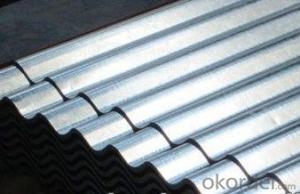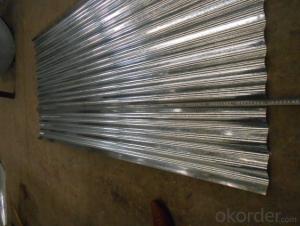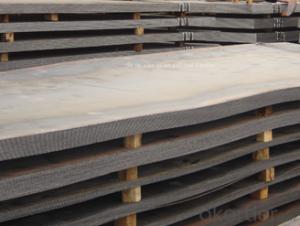S280GD Corrugated Steel Sheet
- Loading Port:
- China Main Port
- Payment Terms:
- TT OR LC
- Min Order Qty:
- -
- Supply Capability:
- -
OKorder Service Pledge
Quality Product, Order Online Tracking, Timely Delivery
OKorder Financial Service
Credit Rating, Credit Services, Credit Purchasing
You Might Also Like
Quick Details
Standard:ASTM, DIN, GB, JIS
Grade:SGCC / DX51D+Z /
Thickness:0.15mm-1.2mm
Place of Origin:Tianjin, China (Mainland)
Model Number:S280GD
Type:Steel Plate
Technique:Hot Rolled
Surface Treatment:Coated
Application:Widely used in construction industry
Special Use:Silicon Steel
Width:790mm-1025mm
Length:as per your request or a fixed length
Note:We support for the third party inspection
- Q:What are the different methods of joining steel sheets?
- There are several methods of joining steel sheets, including welding, riveting, bolting, adhesive bonding, and clinching.
- Q:Can steel sheets be used for manufacturing shipping pallets?
- Certainly, the utilization of steel sheets is applicable in the production of shipping pallets. Steel, a material known for its strength and durability, is capable of enduring heavy loads, rendering it suitable for pallet construction. To establish a robust and dependable pallet structure, steel sheets can be united through welding or bolting. Furthermore, steel pallets possess the added advantage of being resistant to moisture, pests, and fire, which holds significance in certain industries or applications. Nevertheless, it is important to acknowledge that steel pallets generally incur higher costs compared to alternative materials like wood or plastic. Therefore, the decision to employ steel sheets for manufacturing shipping pallets would rely on specific requirements, budgetary constraints, and intended utilization.
- Q:Are steel sheets suitable for oil and gas pipelines?
- Yes, steel sheets are suitable for oil and gas pipelines. Steel is a strong and durable material that can withstand the high pressure and harsh conditions typically found in oil and gas pipelines. Additionally, steel sheets can be easily welded together to create seamless pipelines, ensuring efficient and reliable transportation of oil and gas.
- Q:Are the steel sheets suitable for electrical enclosures?
- Yes, steel sheets are suitable for electrical enclosures. Steel is a highly durable and strong material that provides excellent protection for electrical components. It is resistant to impact, corrosion, and high temperatures, making it an ideal choice for enclosures that house sensitive electrical equipment. Additionally, steel sheets can be easily fabricated and customized to meet specific design requirements, ensuring a perfect fit for the electrical enclosure. Overall, steel sheets offer the necessary strength, durability, and protection needed to house electrical components effectively.
- Q:Can steel sheets be bent or folded?
- Yes, steel sheets can be bent or folded. Steel is a highly versatile material that can be manipulated into various shapes and forms. In fact, the ability to bend or fold steel sheets is one of the reasons why it is widely used in construction, manufacturing, and other industries. Bending or folding steel sheets can be achieved through different methods such as press braking, roll bending, or using specialized tools like bending machines. The process involves applying force or pressure to the steel sheet, causing it to deform and take on the desired shape.
- Q:Can the steel sheets be used for medical equipment?
- Indeed, medical equipment can make use of steel sheets. Steel's robustness, longevity, and resistance to corrosion render it a prevalent substance in the medical sector. It permits the production of an array of medical equipment, including surgical tools, hospital beds, medical trolleys, and diagnostic apparatus. Steel sheets can be conveniently shaped and crafted into diverse forms and dimensions, thereby catering to distinct requirements of medical equipment. Moreover, steel's hygienic attributes, facilitating easy sterilization, establish it as a fitting material for medical equipment necessitating regular sanitization.
- Q:Can steel sheets be used for shipping containers?
- Yes, steel sheets can be used for shipping containers. Steel is a common material used in the construction of shipping containers due to its strength, durability, and ability to withstand harsh weather conditions.
- Q:What are the advantages of using steel sheets in automotive manufacturing?
- There are several advantages of using steel sheets in automotive manufacturing. Firstly, steel sheets provide high strength and durability, making them ideal for withstanding the harsh conditions and stresses experienced by vehicles on the road. This strength allows for safer and more reliable vehicles, as steel sheets provide a strong protective structure that can absorb impact energy in the event of a collision. Secondly, steel sheets offer excellent formability, which means they can be easily shaped and molded into various complex designs required for automotive parts. This versatility allows for the creation of intricate and precise components, ensuring a perfect fit and optimal performance. Additionally, steel sheets have good corrosion resistance properties, which is crucial for automotive applications. Vehicles are subjected to various environmental factors such as moisture, salt, and chemicals, which can lead to rust and corrosion. By using steel sheets with protective coatings, manufacturers can ensure that their vehicles have a longer lifespan and maintain their aesthetic appeal. Moreover, steel sheets are readily available and cost-effective compared to other materials used in automotive manufacturing. Steel is a widely used material in various industries, which means there is a well-established supply chain for steel sheets. This availability not only guarantees a consistent supply for automotive manufacturers but also helps keep production costs manageable. Lastly, steel sheets provide excellent thermal conductivity, which is essential for heat dissipation in automotive applications. Vehicles generate a significant amount of heat, especially in the engine and exhaust systems. Steel sheets help in efficiently transferring and dissipating this heat, preventing overheating and ensuring optimal performance. In conclusion, the advantages of using steel sheets in automotive manufacturing include high strength and durability, excellent formability, good corrosion resistance properties, cost-effectiveness, and efficient heat dissipation. These factors make steel sheets a preferred choice for producing safe, reliable, and long-lasting vehicles.
- Q:What are the standard tolerances for steel sheets?
- The standard tolerances for steel sheets can vary depending on the specific grade, thickness, and dimensions of the sheet. However, common industry tolerances for steel sheets typically range from +/- 0.010 to +/- 0.125 inches for thickness, and +/- 0.005 to +/- 0.25 inches for width and length dimensions.
- Q:What is the difference between a HRPO and HRSPO steel sheet?
- HRPO and HRSPO are two types of steel sheets that differ in the way they are manufactured and their resulting properties. HRPO, which stands for Hot Rolled Pickled and Oiled, involves subjecting a hot rolled steel coil to a pickling process. This process removes impurities and scale from the surface using an acid bath. After pickling, the steel sheet is oiled to prevent corrosion during storage and transportation, resulting in a smooth and clean surface finish. On the other hand, HRSPO, which stands for Hot Rolled Skin Passed and Oiled, goes through an additional process called skin pass after pickling and oiling. During this process, the steel sheet is passed through a set of rolls to improve the surface finish and reduce its thickness. The skin pass process also gives the steel a certain level of cold work, enhancing its mechanical properties. In terms of properties, HRPO steel sheets have good formability, weldability, and paintability due to their clean surface and lack of scale. They are commonly used in applications that require a smooth surface finish, such as appliances, automotive parts, and exposed architectural components. HRSPO steel sheets, on the other hand, have an even better surface finish and reduced thickness compared to HRPO sheets. This makes them ideal for demanding applications where precise dimensional control and surface aesthetics are crucial, such as automotive body panels, electrical enclosures, and furniture manufacturing. In summary, the main difference between HRPO and HRSPO steel sheets lies in the additional skin pass process that HRSPO undergoes. This process results in improved surface finish, reduced thickness, and enhanced mechanical properties. The choice between the two types of steel sheets depends on the specific requirements of the application, such as surface quality, dimensional control, and mechanical performance.
1. Manufacturer Overview |
|
|---|---|
| Location | |
| Year Established | |
| Annual Output Value | |
| Main Markets | |
| Company Certifications | |
2. Manufacturer Certificates |
|
|---|---|
| a) Certification Name | |
| Range | |
| Reference | |
| Validity Period | |
3. Manufacturer Capability |
|
|---|---|
| a)Trade Capacity | |
| Nearest Port | |
| Export Percentage | |
| No.of Employees in Trade Department | |
| Language Spoken: | |
| b)Factory Information | |
| Factory Size: | |
| No. of Production Lines | |
| Contract Manufacturing | |
| Product Price Range | |
Send your message to us
S280GD Corrugated Steel Sheet
- Loading Port:
- China Main Port
- Payment Terms:
- TT OR LC
- Min Order Qty:
- -
- Supply Capability:
- -
OKorder Service Pledge
Quality Product, Order Online Tracking, Timely Delivery
OKorder Financial Service
Credit Rating, Credit Services, Credit Purchasing
Similar products
New products
Hot products
Related keywords




























